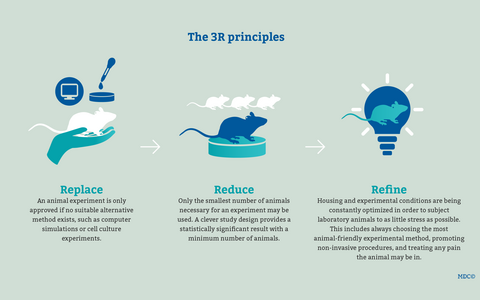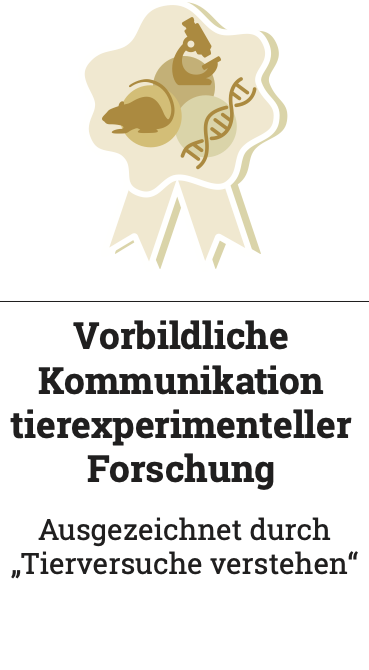
The 3R principles
Replacing, reducing and refining animal experiments
The terms were coined by two British scientists, zoologist William Russell and microbiologist Rex Burch, and first appeared in print in their 1959 book The Principles of Humane Experimental Technique. The responsible regulatory authority will only approve an animal experiment if the scientists, animal facilities and institutions involved implement the 3R principles. This means the experiment is only allowed to take place if there are no alternative methods to achieve the desired scientific objectives. Even then, researchers are allowed to use only a minimum number of animals and the experiments must be designed so that the animals experience as little stress as possible.
The 3R principle
Replace
An animal experiment is only approved if no suitable alternative method exists, such as computer simulations or cell culture experiments.
Reduce
Only the smallest number of animals necessary for an experiment may be used. A clever study design provides a statistically significant result with a minimum number of animals.
Refine
Housing and experimental conditions are being constantly optimized in order to subject laboratory animals to as little as possible. This includes always choosing the most animal-friendly experimental method, promoting non-invasive procedures, and treating any pain the animal may be in.
Implementation
All scientists at the Max Delbrück Center, together with those working in the animal facilities, are committed to the consistent implementation of the 3R principles. In all research projects at the Max Delbrück Center that require animal experiments, the parties involved work to improve the well-being of the laboratory animals and thereby increase the quality of the scientific research.
Examples of methods and technologies developed and improved to achieve this include:
These methods and technologies enable the Max Delbrück Center to reduce the number of animals we use or even avoid the use of animals altogether.
The Max Delbrück Center is directly involved in Berlin’s Einstein Center 3R, the preparatory phase began in 2020. The Center aims to advance the development of alternative methods to animal research in biomedicine and to reduce or replace animal experiments wherever possible. It is expected to be operational in 2021.
Research, animal experiments and the 3Rs
Why animal research?
Why we cannot yet avoid animal testing
Our laboratory animals
PRC Preclinical Research Center
The 3R principles
Research without animal experiments
Mini-organ, mathematical model or mouse?
Facts and figures
Approval and monitoring
Transparent communication


